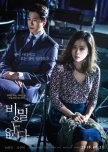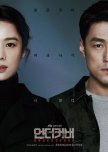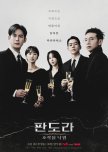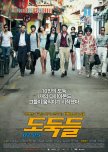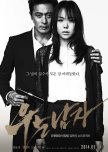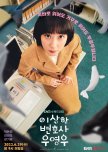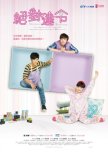 Yoon Sa Bong and Jung Yong Ju are confirmed to join Lee Ha Nee's new K-drama "Knight Flower"
Yoon Sa Bong and Jung Yong Ju are confirmed to join Lee Ha Nee's new K-drama "Knight Flower" Als de vrouw van een parlementslid door een plotselinge tragedie uit de schaduw moet treden, moet ze familiegeheimen en haar eigen bewogen verleden onder ogen zien. (Bron: Netflix) Vertaling bewerken
- Nederlands
- 中文(台灣)
- ภาษาไทย
- Arabic
- Oorspronkelijke titel: 트롤리
- Ook gekend als: Teurolli
- Scenarioschrijver: Ryu Bo Ri
- Regisseur: Kim Moon Kyo, Kwon Da Som
- Genres: Mysterie, Romance, Melodrama, Politiek
Cast & Credits
- Kim Hyun Joo Hoofdrol
- Park Hee Soon Hoofdrol
- Kim Mu Yeol Hoofdrol
- Jung Soo Bin Hoofdrol
- Ryu Hyun KyungJin Seung HuiBijrol
- Ki Tae YoungChoi Gi YeongBijrol
beoordelingen

Deze recentie kan spoilers bevatten
Its empathic. Powerful. Yet, beware: it is rather slow & actually not on the bright side of life
"Trolley" is a SBS production for South Korean TV first of all, even it is promptly running on Netflix, too. One could say that the KDrama is about a politician's wife, who is caught up in an emotionally draining past and overtaken by an extremely unpleasant present. One could say that it is about an ambitious politician with a promising career, who is in the middle of the national assembly election campaign and will give everything for it. One could say that it is about the classic moral trolley dilemma, which is running through the story like a key note – should one intervene in the unstoppable, catastrophic events and sacrifice one human life in the process, or let things take their course, the but then (in the case of the trolley dilemma) will claim several victims? With respect to each of these varying aspects, the story delivers suspense, depth and emotional intensity, enriched with complex details until the end.
"Trolley" is like a large patchwork quilt made up of many colorful, isolated, fateful pieces of the jigsaw puzzle that becomes a whole while increasing in suspense episode by episode. And this spectacular whole is what I particularly appreciate about this KDrama. Because the production is dedicated to a sensitive issue in South Korea society: the devaluation, harassment, oppression, contempt, discrediting, defamation, exploitation, sexualization of women and widespread physical violence against them.
The KDrama articulates a quiet howl calling for change. This howl, which has been rather mute for the longest time, wants a voice. This howl of pain wants to be heard. One voice should become many. Laws protecting women (and victims of abuse in general) would be all well and good. But even more so (and above all) there is a need for courageous role-models of women (and men) who lead the way. (Or for a start: KDramas and their e.g. female protagonists...) Role models are needed, who stand up for themselves, for their lives, for what happened to them, and for their rights as human beings. Tangible role models are needed embodying what lies at the heart of (these much-needed) laws: the non-debatable dignity inherent in every human being, regardless of gender, creed, birth, or ability. Paragraphs alone are not enough. They must be filled with life. With people who dare to actually venture out of the familiar swamp with their heads held high. And that's (for women) still easier said than done in South Korea 2023. "Trolley" embodies these circumstances in an impressive way. In fact, this is more than overdue. This TV production also places this message with some force and spreads it worldwide, too, so it cannot be overheard. Can it? May the message get through and encourage … women, young people, … and men too.
However, the spotlight is not directed at one or 'the' man as such, but at society as a whole, in which women structurally function (or supposed to function) well; in which they themselves participate in the premises - as mothers, as classmates, as part of a bullying, via public and Social media easy to manipulate crowd. The poisonous social thorn is so deeply rooted within women themselves: a systematically and consistently cultivated, inferior attitude towards their life. The the circumstances usually aren´t even seriously questioned because: that's the way it is… has been… (will be?)
Practically all of the women in this KDrama represent a self-esteem that has been deeply hurt and thus weakened as a result of private and public devaluation or even physical violence. They all somehow learned to live with it. They are battered, wounded and scarred, and they suffer from their feeling of inferiority that weakens them into old age. The worst thing about it: that they are still standing there alone, because nobody really can/wants to acknowledge their suffering and justified anger. Women have had to learn to live with the fact that there are no witnesses, no advocate, no encouragement, no attention, no consolation for them and their traumatic experience of harassment. No one is standing in their corner. The social message: You didn't deserve anything else. You´re to blame. 'Submissive, quiet, tame and silenced, everyone can do whatever they want.' Such is fate as a daughter. As an unwanted daughter. As the first daughter. As a daughter-in-law. As a wife. As a divorced woman. As an illegitimate mother. That something, which has remained deeply in these women, now shows impact, too: so that they either secretly and quietly devalue and question themselves, alternatively devalue others on their behalf, or let others devalue them on principle. This painful experience has not been redeemed to this day and should not be redeemed (from the social point of view of some). It is the ingrained yet invisible mark that South Korean society brands its women with. With "Trolley" it is out in the open. In multiple ways. Options for change are discussed, and the difficulties involved are also explored.
A strong portrait of society, cleverly prepared and seriously presented, yet in an entertaining manner. The KDrama meets a red-hot zeitgeist that calls for winds of change. The story courageously challenges the conservative, patriarchal attitude, which by nature denies women the right to be fully acknowledged human beings with the same rights. In the course of the last year, blood boiled high in South Korea after President Yoon declared 'structural sexism' being no longer existent in the Republic and wanted to abolish the Ministry for Equality and Family (or move it to other departments). In these times (see also the side note below), "Trolley" is a courageous and important production, because it tells a different story - that of devalued, sexualized, abused women in a self-satisfied man's world. Respect!
Its empathic. Powerful. Yet, beware: it is rather slow and actually not on the bright side of life.
---------------------------------------------------------------
SIDE NOTE: --- Always burning topical: violence against women in South Korea ---
If you compare the crime statistics in (i.e.) Germany and South Korea, South Korea is clearly the safer country. Seoul is arguably one of the safest cities in the world. But not for women...
Overall, violence in South Korea may be limited. But against women it is alarmingly widespread. Of the violent crimes recorded in South Korea, about 80 percent of the victims are women. In 2020, more than 58 incidents of sexual violence, including rape, were recorded among 100,000 residents in South Korea. (There were 12 in Germany for comparison). There have been newspaper reports of brutal femicides almost weekly in recent years. In a national survey conducted by the Ministry for Gender Equality and Family in the summer of 2021 (the ministry still existed then), 57.8 percent (!) of women stated that they felt threatened by misogynistic violence.
But the current political line is different. President Yoon stands for the values of the so-called "New Men's Solidarity". Behind this is a deeply patriarchal, conservative thinking that denies women to be full human beings with the same rights. Accordingly, the official line tends to go backwards: the penalties for false allegations of sexual assault are increased and the politicians rather argue with classic perpetrator-victim reversal: the women provoked the men by not doing what the men want them to do . Courts rarely judge in the interests of women. On the contrary. The outcome might be: victims of sexual violence are punished more severely than the perpetrators. Law against defamation of sex offenses is far stricter than that on sex offenses. It allows victims of sexual violence to be sentenced to up to 3 years in prison – even if it is proven that their publicly disclosed allegations are true. In the actual cases of sexual offenses, the verdicts against the perpetrators, however, are mostly merciful, with a mild sentence for crimes against women, as soon as there is one or the other weakening reason or an impeccable good reputation. Lax investigations and re-traumatizing behavior towards female victims in police and judicial authorities make matters worse.
All in all, it is very difficult for women to effectively defend themselves against the violence they might have experienced. Headwind blows from almost everywhere. Here we are again with the deeply patriarchal, conservative basic attitude of a society that denies women as a matter of course that they are full human beings with the same rights. This 'self-evidence' needs to be questioned and confronted. Resistance works best when women unite and at least start to stop this structural mutual devaluation among themselves. Speak, talk, share, cry, console... You don't need laws for that. Supporting one another, acknowledging injustice as such, comfort and compassion would be soothing ointments on the wounds of countless women that could heal a little bit better that way.
Vond je deze recentie nuttig?

Deze recentie kan spoilers bevatten
surprising twists for a change
This one surprised me and in a positive way.I watched it because I am a longtime fan of Park Hee-soon and was glad to see a new drama with him in the lead role.
What is it about? Well, secrets, lies, denial and the ever same muddy downpath of politics.
We get to see a rather shy female lead character who is married to an obviously really nice and considerate husband. He started in politics and for her personal reasons the fl asks her husband for him to keep her out of it and the limelight. He believably promises to do so.
The rather idyllic family picture gets first scratches when their student son is suddenly found dead. We just get clues what could have happened to him but can't be sure. Then, out of nowhere for the couple, the gilrfriend of the son shows up at their doorstep claiming to be pregnant from the deceased. Unwillingly they take her in, also to prevent any image damaging scandal to get out.
Rather slowly, step by further step we find out about the fl's past and what is haunting her, and understandably why she is shy and wants to stay out of the limelight.
Around episode six I was fully sold to the ml being a nice and caring husband and even felt angry towards the fl for not just talking to him and telling him her problem. At that point I couldn't understand why she would not confide in this caring husband of hers. I fully fell for his ways and believed him.
But slowly things start to feel uncertain concerning the ml. Is he really that caring and trustworthy husband? Until epsidode12 I started to feel torn, just like the fl, I was sure he was dishonsest, (and in many ways, especailly _EXcluding_ being unfaithful to her!) I got angry with him and when she confronts him once and again he is so convincingly sad, sounds so truthful and gives such heartfelt explanations that I doubted the feeling of mistrust again Oo
Only in the last four episodes things become clear about the motives and background ties several people have, and it was a first in a long time that I sat in front of the screen being so surprised about the story twists and revelations that come up I even said 'no way! No he did not!' out loud.
Like most I am used to knowing rather fast into a drama who did what, who lies, who betrayed whom. But here I felt so unsure and I was genuinly suprised what happened in the late episodes of this drama, especially concerning the ml who succeeded in luring me in and making be doubt my momentary impression again and again. I just wanted to believe him.
The whole story is also about how rather often women and girls experience vioelence, especially sexual violence and assault, and the rather sad fact that still in many countries the victims are made the guilty ones by society and even police and courts.
The name of the drama 'trolley' is explained quite in the beginning, and in the end makes perfect sense, showing you can only do one good for the cost of another, but never save everyone without losing someone else.
It's a bitter ending with lots of pain, and hurt feelings and some sparks of hope at least.
I highly recommend this if you like dramas that are not obvious and where you won't get everything spoonfed with a verbal explanation. If you are patient enough this drama gets very tense and at least I was not able to pause watching the last 5 episodes, I just had to know what happens next.
I also was (once again, but I might be biased ;) impressed by Park Hee-soon. I first saw him in a movie called 'the scent' many years ago, where, in a completely different setting and mood, he had that ability that although he betrays and does questionable things, I am willing to forgive his character. Same, in a starkly different setting again in 'my name' where in his role as Choi Mu-jin I defintely know he is dangerous and brutal, he still drew me in and I felt sorry for him. This was now the third time, here in a setting as believably caring and loving husband where I just wanted to believe him and even in the very end, after knowing what he did, still felt sorry for him and kind of liked him.
Seems like he as a special psychological thing going and working on me to fall for this and throw my rightly warning ratio overboard.
Vond je deze recentie nuttig?

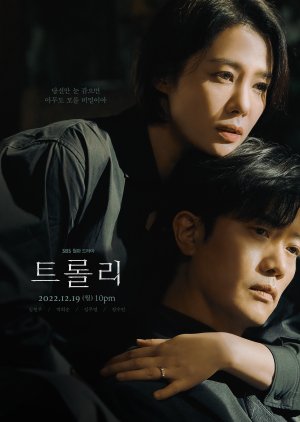








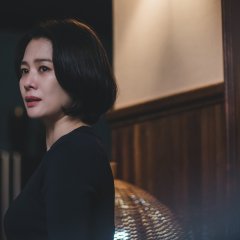
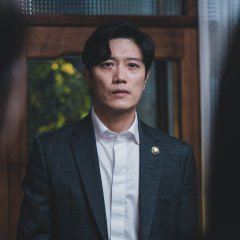
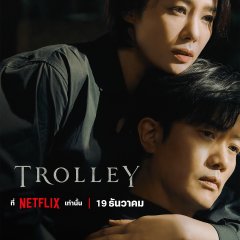
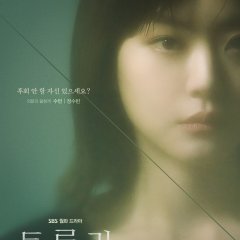
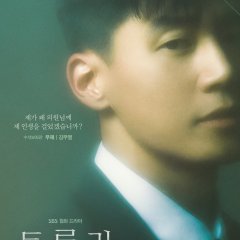
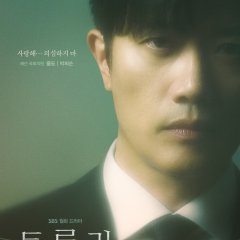
 2
2

